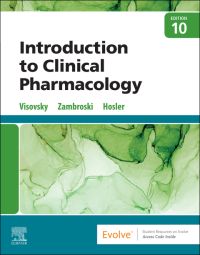Introduction to Clinical Pharmacology - E-Book, 10th Edition
New to this edition
- NEW! Get Ready for the Next Generation NCLEX® Examination! section includes key points, review questions, and case studies with Next Generation NCLEX-format questions to prepare students for the new licensure examination.
- NEW! Reorganized chapters break up lengthy content and more logically present pharmacological content by body system or major disorder.
- UPDATED! Coverage of newly approved and updated pharmaceutical treatments and drugs prepares students for practice.
Author Information
By Constance G. Visovsky, PhD, RN, ACNP-BC, FAAN, Professor and Lewis & Leona Hughes Endowed Chair in Nursing Science, College of Nursing, University of South Florida, Tampa, Florida; Cheryl H. Zambroski, PhD, RN, Associate Professor, College of Nursing, University of South Florida, Tampa, Florida and Shirley M. Hosler, MSN, RN, Formerly, Nursing Instructor, School of Nursing, National American University, USA


